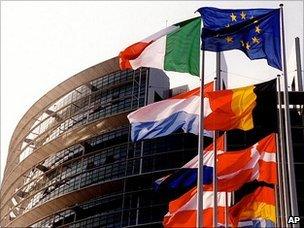Fourth Euro MP named in lobbying scandal
- Published

The European Parliament is reviewing its lobbying rules in light of the scandal
A fourth Euro MP caught up in a "cash-for-laws" scandal has denied wrongdoing as the European Parliament investigates corruption allegations.
Spanish MEP Pablo Zalba said he had been "deceived" by the Sunday Times undercover reporters and had not accepted their offer of cash.
But he said he did amend draft legislation at the request of the reporters posing as lobbyists.
Two other MEPs have resigned in the affair and a third has left his party.
Mr Zalba, of Spain's centre-right Popular Party (PP), said he was the victim of a "trap", in which the pretend lobbyists had requested two amendments to draft legislation on consumer protection.
He said he rejected the first amendment but agreed to put forward the second because he thought it would help protect small investors, Spain's El Pais news website reported.
According to the UK's Sunday Times newspaper, the undercover team made it clear to Mr Zalba that he would be paid for his services.
Resignations
Last week Slovenian MEP Zoran Thaler and Austrian MEP Ernst Strasser resigned from the parliament, after the Sunday Times newspaper first made the allegations.
The paper alleged the pair and Romanian MEP Adrian Severin had accepted offers of cash in exchange for influencing laws.
Mr Severin was expelled from the centre-left Socialists and Democrats (S&D) bloc in the parliament but remains an independent MEP.
All three have denied wrongdoing. The Sunday Times says each of them is being investigated by their national anti-corruption authorities.
The Sunday Times says some of the legal amendments requested by the undercover team now appear in the European Parliament's official documents.
The parliament's security staff have now sealed off the affected MEPs' offices to prevent any tampering with evidence, a senior parliament source, who asked not to be named, told the BBC.
The bureau of Parliament President Jerzy Buzek is handling the investigation and will decide if the parliament's rules on lobbying need to be changed, the source said.
'Zero tolerance'
Mr Buzek has written to the foreign ministries in the MEPs' home countries, asking to be kept informed about their anti-corruption investigations.
His bureau is also examining documentary and videotape evidence handed over by the Sunday Times, beyond what the paper has published, the source added.
Last week Mr Buzek said: "We are determined to practise zero tolerance of the kind of actions that led to the resignation of our colleagues."
Addressing MEPs, he said the parliament must "strengthen its code of conduct, external" for such cases and introduce "a legally binding code of conduct for lobbying in EU institutions".
Under the current rules, lobbyists do not have to join the existing parliamentary register of lobbyists.
The European Commission and parliament plan to bring in a joint register of lobbyists, but it will still not be compulsory.
In practice, lobbyists who want an access badge for the European Parliament have to join the existing register, the parliamentary source told the BBC.
Last week the parliament rebuffed the EU anti-fraud agency Olaf when it sought to investigate the lobbying affair.
The parliament considers that this case is beyond Olaf's remit, which is to monitor how the EU budget is spent, the source explained.
- Published21 March 2011
- Published4 March 2011
- Published13 February 2014